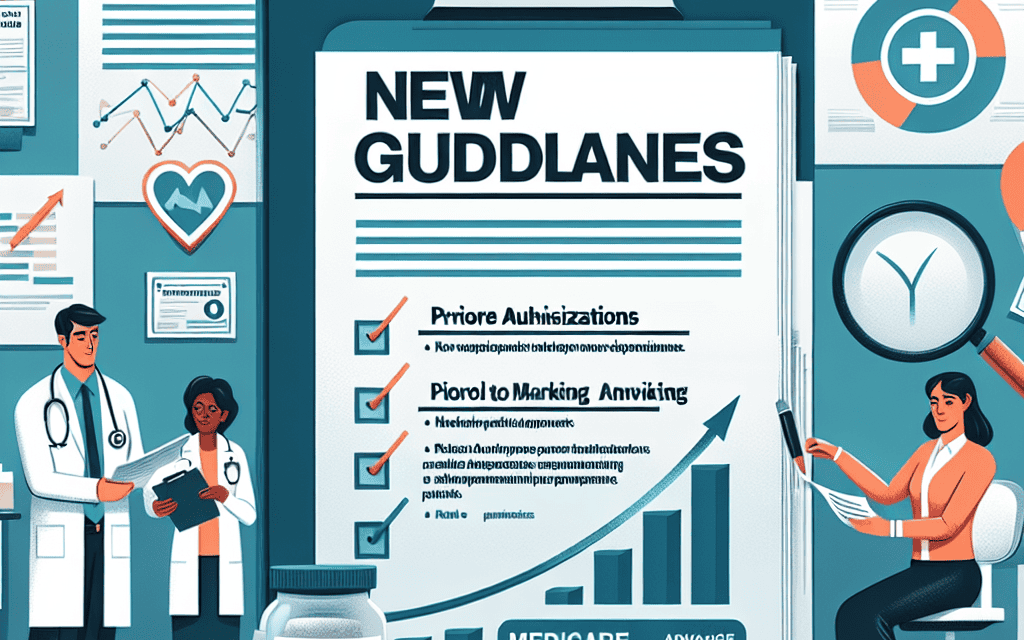CMS Introduces New Guidelines for Medicare Advantage Prior Authorizations and Marketing
The Centers for Medicare & Medicaid Services (CMS) has recently introduced new guidelines aimed at reforming the processes surrounding Medicare Advantage (MA) prior authorizations and marketing practices. These changes are designed to enhance patient care, streamline administrative processes, and ensure that beneficiaries receive the services they need without unnecessary delays. This article delves into the implications of these new guidelines, exploring their impact on healthcare providers, beneficiaries, and the overall Medicare Advantage landscape.
Understanding Medicare Advantage and Prior Authorizations
Medicare Advantage plans, also known as Medicare Part C, are offered by private insurance companies and provide an alternative to traditional Medicare. These plans often include additional benefits such as vision, dental, and wellness programs. However, one of the significant challenges faced by beneficiaries is the prior authorization process, which requires healthcare providers to obtain approval from the insurance company before delivering certain services or medications.
Prior authorizations are intended to ensure that the services provided are medically necessary and appropriate. However, the process can often be cumbersome and time-consuming, leading to delays in patient care. According to a 2021 survey by the American Medical Association (AMA), 93% of physicians reported that prior authorization delays patient care, and 78% indicated that the process has worsened over the past five years.
Key Changes in CMS Guidelines
The new CMS guidelines introduce several critical changes aimed at improving the prior authorization process and marketing practices for Medicare Advantage plans. These changes include:
- Streamlined Prior Authorization Processes: CMS is mandating that Medicare Advantage plans implement standardized processes for prior authorizations, reducing the administrative burden on healthcare providers.
- Transparency Requirements: Plans must provide clear information about the prior authorization process, including the criteria used to determine medical necessity.
- Timely Decisions: The guidelines require that prior authorization requests be processed within a specified timeframe, ensuring that beneficiaries receive timely access to necessary services.
- Marketing Practices: New regulations aim to enhance transparency in marketing practices, ensuring that beneficiaries receive accurate information about their coverage options.
- Patient-Centric Approach: The guidelines emphasize a focus on patient care, encouraging plans to prioritize the needs of beneficiaries in their decision-making processes.
Impact on Healthcare Providers
The new CMS guidelines are expected to have a significant impact on healthcare providers who participate in the Medicare Advantage program. By streamlining the prior authorization process, providers can expect to see a reduction in administrative burdens, allowing them to focus more on patient care. Here are some key implications for healthcare providers:
- Reduced Administrative Burden: The standardized processes mandated by CMS will help reduce the time and resources spent on obtaining prior authorizations. This change is particularly beneficial for smaller practices that may lack the administrative support to navigate complex authorization processes.
- Improved Patient Care: With quicker access to necessary services, healthcare providers can deliver timely care to their patients. This is especially crucial for patients with chronic conditions who require ongoing treatment and monitoring.
- Enhanced Communication: The transparency requirements will facilitate better communication between providers and Medicare Advantage plans. Providers will have clearer guidelines on what is required for prior authorizations, reducing the likelihood of denials and appeals.
- Increased Accountability: The new guidelines hold Medicare Advantage plans accountable for their prior authorization processes. Providers can expect more consistent and fair treatment when submitting requests for authorization.
- Potential for Increased Revenue: By reducing delays in care, providers may see an increase in patient volume and revenue. Timely authorizations can lead to quicker treatment, resulting in better health outcomes and higher patient satisfaction.
Effects on Beneficiaries
The changes introduced by CMS are designed to benefit Medicare Advantage beneficiaries significantly. By addressing the challenges associated with prior authorizations and marketing practices, these guidelines aim to enhance the overall experience for beneficiaries. Here are some of the expected effects on beneficiaries:
- Improved Access to Care: With streamlined prior authorization processes, beneficiaries can expect quicker access to necessary services and treatments. This is particularly important for those with urgent medical needs.
- Greater Transparency: The new transparency requirements will empower beneficiaries with better information about their coverage options. They will have access to clear details about what services require prior authorization and the criteria used to evaluate requests.
- Enhanced Decision-Making: Beneficiaries will be better equipped to make informed decisions about their healthcare options. With accurate information about their plans, they can choose the coverage that best meets their needs.
- Reduced Confusion: The guidelines aim to reduce confusion surrounding the prior authorization process. Beneficiaries will have a clearer understanding of what to expect when seeking care, leading to less frustration and anxiety.
- Increased Satisfaction: Overall, the improvements in the prior authorization process and marketing practices are expected to lead to higher levels of satisfaction among Medicare Advantage beneficiaries. Timely access to care and clear communication can significantly enhance the patient experience.
Challenges and Considerations
While the new CMS guidelines present numerous benefits, there are also challenges and considerations that stakeholders must address. Implementing these changes will require collaboration between Medicare Advantage plans, healthcare providers, and beneficiaries. Some of the key challenges include:
- Implementation Costs: Medicare Advantage plans may face initial costs associated with implementing the new guidelines. This includes training staff, updating systems, and ensuring compliance with the new requirements.
- Resistance to Change: Some healthcare providers may be resistant to changes in the prior authorization process, particularly if they have established workflows that they are comfortable with. Overcoming this resistance will require effective communication and education.
- Monitoring Compliance: CMS will need to establish mechanisms for monitoring compliance with the new guidelines. Ensuring that Medicare Advantage plans adhere to the requirements will be crucial for the success of the reforms.
- Potential for Increased Denials: While the guidelines aim to reduce denials, there is a possibility that some plans may still deny requests based on their internal criteria. Ongoing advocacy will be necessary to ensure that beneficiaries receive fair treatment.
- Balancing Cost and Care: Medicare Advantage plans must balance the need to control costs with the imperative to provide high-quality care. Striking this balance will be essential for the sustainability of the program.
Future Implications for Medicare Advantage
The introduction of new guidelines by CMS marks a significant step toward improving the Medicare Advantage program. As the healthcare landscape continues to evolve, these changes will likely have lasting implications for the future of Medicare Advantage. Some potential future implications include:
- Increased Enrollment: As beneficiaries experience improved access to care and enhanced transparency, it is likely that enrollment in Medicare Advantage plans will increase. This could lead to greater competition among plans, ultimately benefiting consumers.
- Focus on Value-Based Care: The new guidelines align with the broader shift toward value-based care in the healthcare system. Medicare Advantage plans may increasingly focus on delivering high-quality care while managing costs effectively.
- Innovation in Care Delivery: The emphasis on patient-centric approaches may drive innovation in care delivery models. Plans may explore new ways to engage beneficiaries and provide services that meet their unique needs.
- Policy Evolution: The success of these guidelines may prompt further policy changes in the Medicare Advantage program. Stakeholders will likely advocate for additional reforms to enhance the program’s effectiveness and efficiency.
- Collaboration Among Stakeholders: The implementation of these guidelines will require collaboration among various stakeholders, including CMS, Medicare Advantage plans, healthcare providers, and beneficiaries. Building strong partnerships will be essential for achieving the desired outcomes.
Conclusion
The new CMS guidelines for Medicare Advantage prior authorizations and marketing practices represent a significant shift in the way these plans operate. By streamlining processes, enhancing transparency, and prioritizing patient care, these changes aim to improve the overall experience for beneficiaries and healthcare providers alike. While challenges remain, the potential benefits of these reforms are substantial, paving the way for a more efficient and patient-centered Medicare Advantage program.
As stakeholders navigate the implementation of these guidelines, ongoing collaboration and advocacy will be crucial to ensure that the needs of beneficiaries are met. The future of Medicare Advantage looks promising, with the potential for increased enrollment, innovation in care delivery, and a continued focus on value-based care. Ultimately, these changes have the potential to transform the Medicare Advantage landscape, leading to better health outcomes and enhanced satisfaction for millions of beneficiaries.





